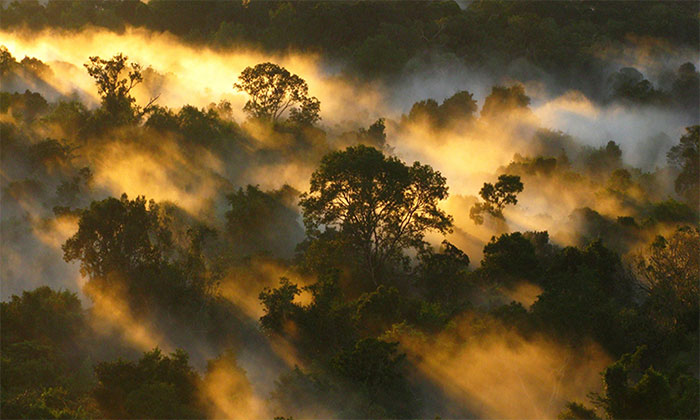Tropical forests are losing their ability to absorb carbon
The carbon sequestration capacity of pristine tropical forests around the world has dropped by about a third from the 1990s, the new study says.
The conclusion came after three decades of tracking more than 300,000 woody trees inside unaffected tropical rainforests in the Amazon and Africa. The research, conducted by scientists from Europe and Africa, was published in the journal Nature last week.

Amazon forest at dawn.(Photo: Peter Vander Sleen).
The team, led by the University of Leeds in the UK, said they used aluminum nails to mark each tree and returned to the test after a few years to measure their diameter and height. This allows them to calculate the amount of carbon stored inside living or dead trees. The recorded data shows that tropical forests now absorb less than one-third of the carbon that was measured in the 1990s.
Research has provided evidence that tropical forests in Africa have shown signs of carbon sequestration decline since 2010, later than in the Amazon region. This is because the Amazon rainforest is more severely affected by global warming, with temperatures rising faster and droughts occurring more frequently.
The team predicts that in the next 10 years, African forests will absorb 14% less carbon dioxide . By the 2060s, typical tropical forests around the world could even become the source of carbon emissions due to forest fires, deforestation and excess greenhouse gases released into the atmosphere. "Instead of diminishing, rainforests can exacerbate climate change," said ecologist Simon Lewis at the University of Leeds.
- Modify pine to increase carbon uptake
- Climate change reduces the ability of plants to absorb CO2
- Measuring carbon to save tropical forests
- Ancient trees absorb more CO2 than young trees
- The ocean is losing its ability to absorb CO2
- Secondary forest - The key to reducing emissions
- Nearly 95% of tropical forests are in danger
- Tropical forests disappeared 300 million years ago
- Transform pine trees to increase carbon absorption
- Protection of tropical forests: three main obstacles
- 80% of tropical forests may disappear due to climate change
- This is the last shield to minimize the effects of climate change?
- The biodiversity of tropical forests shows that there are many different models
- Scientists find a low-cost and effective solution to combat deforestation
 Why do potatoes have eyes?
Why do potatoes have eyes? 'Tragedy' the world's largest carnivorous life: Death becomes ... public toilet
'Tragedy' the world's largest carnivorous life: Death becomes ... public toilet Tomatoes were once considered 'poisonous' for 200 years
Tomatoes were once considered 'poisonous' for 200 years Detecting microscopic parasites on human face
Detecting microscopic parasites on human face Genghis Khan massacred many people to change the atmosphere
Genghis Khan massacred many people to change the atmosphere  World's first wind-powered CO2 capture facility
World's first wind-powered CO2 capture facility  What happens if trees stop absorbing CO2?
What happens if trees stop absorbing CO2?  Invented powder that can absorb CO2 more effectively than trees
Invented powder that can absorb CO2 more effectively than trees  Scientists for the first time made diamonds from red peonies
Scientists for the first time made diamonds from red peonies  Diamond is not the hardest material on Earth
Diamond is not the hardest material on Earth 